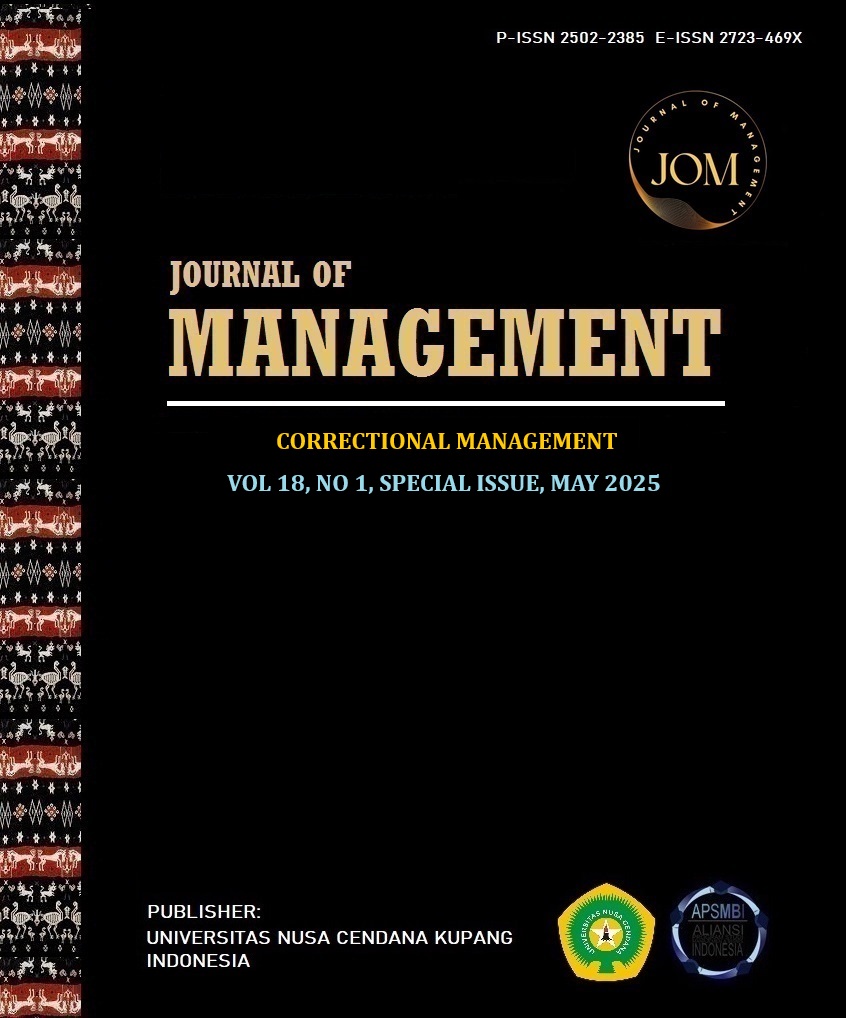THE INFLUENCE OF SELF-DISCLOSURE ON PRISONER RESILIENCE AT CLASS IIB STATE DETENTION CENTER PRABUMULIH
Abstract
This study focuses on the influence of self-disclosure on the resilience of drug offenders in Class IIB Prabumulih Prison. Self-disclosure, defined as the process of sharing personal information and feelings with others, plays a crucial role in helping inmates adapt to the challenging prison environment. By openly communicating their thoughts and experiences, inmates can foster supportive relationships with peers and prison staff, which can significantly impact their resilience. Resilience, in this context, refers to the ability of individuals to endure and recover from stressors and difficult situations, such as the experience of incarceration. It encompasses various dimensions, including emotional strength, adaptability, and social support. This research employs a quantitative methodology, utilizing questionnaires to collect data from inmates regarding their levels of self-disclosure and resilience. The findings reveal a positive relationship between these two variables, suggesting that higher levels of self-disclosure are associated with greater resilience among inmates. This research contributes to the understanding of psychological dynamics within correctional facilities and underscores the importance of fostering communication among inmates as a means to enhance their resilience.
Keywords: Self-Disclosure; Resilience; Drug Offenders; Class IIB Prabumulih Prison
Downloads
References
Arikunto, & Suharsimi. (2007). Prosedur Penelitian Suatu Pendekatan Praktek. Jakarta: Rineka
Burns, & Anne. (2010). Doing Action Research in English Languae Teaching. New York: Routledge.
C, M. N. (1981). Encyclopedia of Psychological Problem. California: Zondervan.
Campbell-Sills, L. &. (2007). Psychometric Analysis and Refinement of the Connor-Davidson Resilience Scale (CD-RISC) : Validation of a 10 Item Measure of Resilience. Journal of Traumatic Stress, 1019-1028.
Capriati, R. A. (2020). Hubungan Antara Self Disclosure Dengan Resiliensi Pada Remaja Anak Mantan Pekerja Seks Komersial Di Dolly Surabaya.
Conner, T. S. (2020). Anticipated regret as an additional predictor in the theory of planned behaviour: A meta-analysis. Psychological Sciences, University of Leeds.
Connor, K. M. (2003). Development of a new Resilience scale : The Connor-Davidson Resilience Scale (CD-RISC). Depresion and Anxiety, 78-82.
Cresswel. (2014). Research Design Qualitative, Quantitative, and Mixed Methods Approaches (4th ed.). SAGE Publications, Inc.
Cresswel. (2015). Educational Research Planning, Conducting, and Evaluating Quantitative and Qualitative Research. Boston: Pearson.
Cresswel. (2018). Research Design: Qualitative Quantitative, and Mixed Methods Approaches (5th ed.). New York: SAGE Publications, Inc.
Cronbach, L. (1963). Educational Psychology 2nd Edition. New York: Harcoury, Bruce and World.
D, K., P, S., & A, T. (1982). Judgement Under Uncertainty: Heuristics and Biases. Cambridge: Cambridge University Press.
Delia, A. (2009). Hubungan Antara Optimisme dan Penyesuaian Diri Dengan Stress Pada Narapidana Kasus Napza di Lapas Kelas IIA Bulak Kapal Bekasi. Journal of extention, 6-7.
DeVito, J. A. (2012). The Interpersonal Communcation Book (13th Edition). New York: Perason Education Inc.
Ding, Y. (2019). Modelling continued use of information systems from a forward-looking perspective: Antecedents and consequences of hope and anticipated regret. Information & Management.
Ester, E. A. (2020). Peran Self Disclosure Terhadap Resiliensi Pada Remaja DI Panti asuhan. Psychopolytan, 119-125.
Fletcher, D. &. (2013). Psychological resilience : A review and critique of definitions, concepts, and theory. European Psychologist, 12-23.
Gracia-Leon, M. A., Gonzalez-Gomez, A., Robles-Ortega, H., Padilla, J. L., & Peralta-Ramirez, M. I. (2019). Psychometric Properties Of The Connor-Davidson Resilience Scale (CD-RISC) In The Spanish Population. Anales de Psicologia, 35(1), 33-40.
Hemenover, S. H. (2015). The good, the bad, and the healthy : Impacts of emotional disclosure of trauma on resilient self concept and psychological distress. Personality and Social Psychology Bulletin, 1236-1244.
Husein, U. (1999). Metodologi Penelitian Aplikasi Dalam Pemasaran. Jakarta: PT Gramedia Pustaka.
Jacquelyn Harvey., K. B. (2021). Self-Disclosure and Psychological Resilience : The Mediating Roles of Self-Esteem and Self-Compassion. Interpersona Journal.
Joni, C., & Putra, D. P. (2022). Pengaruh Harapan Terhadap Kecenderungan Residivis Pada Narapidana di Lembaga Pemasyarakatan Kelas IIB Lubuk Basung. Jurnal Pendidikan dan Konseling.
Neuman, L. (2013). Metodologi Penelitian Sosial Pendekatan Kualitatif dan Kuantitatif Edisi 7. Jakarta: Indeks.
Prahastiwi, D. P. (2023). Statistik Kriminal 2023. Jakarta: Badan Pusat Statistik.
Snyder. (1994). The Psychology of Hope: You can get there from here. New York: The Free Press.
Snyder. (2007). Hope and Optimism as Related to Life Satisfaction. 1.
Sujarweni. (2019). The Master Book of SPSS. Yogyakarta: STARTUP.

 M Satrio Gadang Kuncoro(1*)
M Satrio Gadang Kuncoro(1*)



